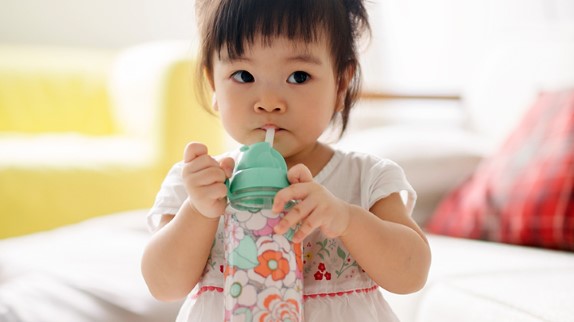Cruise through the supermarket aisles and you’ll see loads of drinks marketed for kids. And while many of them may look healthy, how can you tell which ones are truly good for your toddler’s growing body?
Instead of spending precious time reading nutrition labels in the grocery aisle (while your tot has a meltdown), check out our handy drink-reference guide. We’ve made it easy to decide which drinks to pick and which drinks to skip.
What are the healthiest drinks for toddlers and kids?
- Milk: Believe the slogan: Milk really does a body good — as long as your little one is at least 1 year old, that is. In particular, milk’s calcium and vitamin D content is especially important in building your toddler’s bones and teeth. Just be sure to leave the premixed flavored milks on the shelf; they contain more sugar, fat and calories than the regular variety. If your child isn't crazy about moo juice, you might offer her enriched soy milk, which is a little sweeter than cow’s milk and has the same amount of calcium. When serving milk, do keep in mind that your toddler can get too much of a good thing. If she drinks too much milk, this could blunt her appetite for the other nutritious foods she needs. Shoot for about 16 ounces of milk a day.
- Water: Water is sugar-free, fat-free, calorie-free and additive-free. Plus, if it’s coming straight from the tap, it probably contains fluoride, which prevents cavities. (If your water isn’t fluoridated, ask your pediatrician or dentist about whether or not your toddler needs a fluoride supplement.) What if plain water is too boring for your tot? Add citrus slices to make this healthy drink yummier.
What drinks can my toddler have in moderation?
- 100 percent juice: Toddlers between the ages of 1 and 3 should have no more than 4 ounces of juice a day, according to the American Academy of Pediatrics (AAP). Juice contains a ton of sugar, which can be irritating on your child's stomach and increase risk of cavities. It's okay to offer some juice in moderation, but make sure it's 100 percent juice (such as apple, orange, cranberry or pomegranate), which can provide some nutrients to a busy, picky toddler. Remember, too, that your tot shouldn’t be toting a sippy cup filled with juice all day long. Stick to no more than 4 ounces in a given day and avoid serving it every day so as not to spoil your toddler’s appetite for other nutritious foods. One trick to making a little juice go a long way: Dilute it with water (half juice with half water).
- Smoothies: While these blended drinks shouldn’t be used to quench your toddler’s thirst around the clock, smoothies can be a great snack to fuel your child with nutrients. A few tasty options: Mix milk with crushed ice, raspberries and oranges; blend yogurt (regular or frozen) with bananas and strawberries; blend crushed ice alone with your toddler’s favorite fruits or vegetables.
What drinks should toddlers and kids avoid?
- Fruit drinks and soda: No one would spoon out teaspoon after teaspoon of sugar, plop it into a sippy cup of water, give it a stir and then hand it to her toddler with a hearty, “Bottoms up!” Yet that’s essentially what your toddler is drinking when she has fruit “drinks” (which contain added sugar and less than 100 percent juice), regular soda, vitamin waters and sports and energy drinks. As a result, these beverages are among the biggest sources of refined sugar in children’s diets and a major cause of childhood obesity and tooth decay. So even though these drinks are often designed to attract your toddler’s attention, leave them on the shelf.
- Caffeinated drinks: You also wouldn’t give your toddler a double-shot of espresso and then expect her to go night-night without a fight. But you may not realize that beverages such as iced tea, sports and energy drinks, vitamin waters and many sodas (even orange and clear ones), contain caffeine or other stimulants (as if the extra sugar and calories in these drinks isn’t bad enough). Young children are a lot more susceptible to caffeine’s effects than adults, which, in addition to disrupting sleep and nap times, can cause jitteriness, headaches, tummy troubles and difficulty concentrating.





 Trending On What to Expect
Trending On What to Expect






